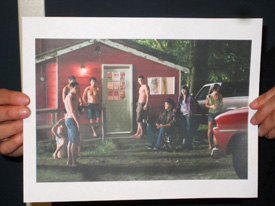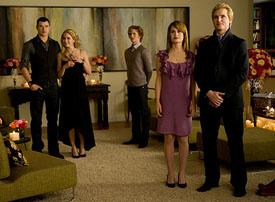Racial and Class Stereotypes in Twilight
Twilight pits vampires (the Cullens) against the wolf pack (the Quileute boys) in many ways as Meyer and Summit Entertainment highlight racial and class discrepancies between the two groups.
Those "Hot" Indians
Jacob, played by Taylor Lautner, may be a teenage heartthrob, but his continual depiction without a shirt shows how over sexualized, exoticized, and macho the fictional Quileute wolfpack
 is. Meyer describes the sexual, exotic Jacob as having “russet skin…bare-chested, wearing nothing but a pair of old cut-off jeans” (Eclipse, 183, 215). Likewise in the movie New Moon, Bella confronts a shirtless Jacob and his new tattoo, as he stands literally hot and steamy in the rain. Later in the film, as Bella gains more access to the wolf pack, the overly virile, meathead behavior that characterizes the Quileute boys becomes more apparent—out of sheer rage, Paul phases into a wolf and violently brawls with Jacob the wolf, and later at Emily’s house the boys bicker impolitely at the dinner table.
is. Meyer describes the sexual, exotic Jacob as having “russet skin…bare-chested, wearing nothing but a pair of old cut-off jeans” (Eclipse, 183, 215). Likewise in the movie New Moon, Bella confronts a shirtless Jacob and his new tattoo, as he stands literally hot and steamy in the rain. Later in the film, as Bella gains more access to the wolf pack, the overly virile, meathead behavior that characterizes the Quileute boys becomes more apparent—out of sheer rage, Paul phases into a wolf and violently brawls with Jacob the wolf, and later at Emily’s house the boys bicker impolitely at the dinner table.
The Classy Cullens
In comparison to the Cullens (with their beautiful mansion, fine clothes, and luxury cars) the Quileute wolf pack and their modest homes, tattered  clothes, and lack of shoes seem to represent the lower end of the class continuum. In all of the movies, Jacob shows up at Forks High School to whisk away Bella, curiously never seeming to attend a school of his own. Lack of education aside, the movie Eclipse reduces the esteemed responsibility of Billy Black’s tribal council leadership to the telling of ghost stories around a campfire. Furthermore, The Twilight Saga labels Quileute society with infidelity and broken family structures; Sam’s rise to alpha male stems from the necessity to be unlike his deadbeat dad, and Embry’s wolf “gene” comes from his Makah mother’s illicit affair with an uncertain but married Quileute father (Eclipse, 418). While many of these traits—being poor, uneducated, and having ubiquitous and dysfunctional relationships—are common among all groups of people, The Twilight Saga reinforces these shortcomings as synonymous with the Quileute, and in essence, all Native Americans.
clothes, and lack of shoes seem to represent the lower end of the class continuum. In all of the movies, Jacob shows up at Forks High School to whisk away Bella, curiously never seeming to attend a school of his own. Lack of education aside, the movie Eclipse reduces the esteemed responsibility of Billy Black’s tribal council leadership to the telling of ghost stories around a campfire. Furthermore, The Twilight Saga labels Quileute society with infidelity and broken family structures; Sam’s rise to alpha male stems from the necessity to be unlike his deadbeat dad, and Embry’s wolf “gene” comes from his Makah mother’s illicit affair with an uncertain but married Quileute father (Eclipse, 418). While many of these traits—being poor, uneducated, and having ubiquitous and dysfunctional relationships—are common among all groups of people, The Twilight Saga reinforces these shortcomings as synonymous with the Quileute, and in essence, all Native Americans.
Contrasting representations of class in Twilight movies.
(Images: Summit Entertainment. Top photo: Burke Museum.)

